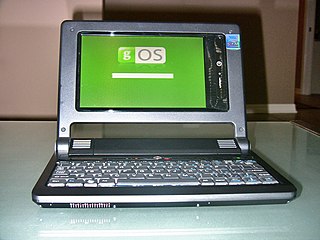Related Research Articles

A desktop computer, often abbreviated as desktop, is a personal computer designed for regular use at a stationary location on or near a desk due to its size and power requirements. The most common configuration has a case that houses the power supply, motherboard, disk storage ; a keyboard and mouse for input; and a monitor, speakers, and, often, a printer for output. The case may be oriented horizontally or vertically and placed either underneath, beside, or on top of a desk.

A laptop computer or notebook computer, also known as a laptop or notebook, is a small, portable personal computer (PC). Laptops typically have a clamshell form factor with a flat-panel screen on the inside of the upper lid and an alphanumeric keyboard and pointing device on the inside of the lower lid. Most of the computer's internal hardware is in the lower part, under the keyboard, although many modern laptops have a built-in webcam at the top of the screen, and some even feature a touchscreen display. In most cases, unlike tablet computers which run on mobile operating systems, laptops tend to run on desktop operating systems, which were originally developed for desktop computers.

A netbook is a small-sized laptop computer; they were primarily sold from 2007 until around 2013, designed mostly as a means of accessing the Internet and being significantly less expensive.
In computing, instant-on is the ability to boot nearly instantly, allowing to go online or to use a specific application without waiting for a PC's traditional operating system to launch. Instant-on technology is today mostly used on laptops, netbooks, and nettops because the user can boot up one program, instead of waiting for the PC's operating system to boot. This allows a user to launch a single program, such as a movie-playing program or a web browser, without the need of the whole operating system. There still remain a few true instant-on machines such as the Atari ST, as described in the Booting article. These machines had complete Operating Systems resident in ROM similar to the way in which the BIOS function is conventionally provided on current computer architectures. The "instant-on" concept as used here results from loading an OS, such as a legacy system DOS, with a small hard drive footprint. Latency inherent to mechanical drive performance can also be eliminated by using Live USB or Live SD flash memory to load systems at electronic speeds which are orders of magnitude faster.
Linux adoption is the adoption of Linux-based computer operating systems (OSes) by households, nonprofit organizations, businesses, and governments.
The Intel Graphics Media Accelerator (GMA) is a series of integrated graphics processors introduced in 2004 by Intel, replacing the earlier Intel Extreme Graphics series and being succeeded by the Intel HD and Iris Graphics series.
HP Pavilion is a discontinued line of consumer-oriented personal computers originally produced by Hewlett-Packard and later by its successor, HP Inc. Introduced in 1995, HP has used the name for both desktops and laptops for home and home office use.
Jiangsu Lemote Tech Co., Ltd or Lemote is a computer company established as a joint venture between the Jiangsu Menglan Group and the Chinese Institute of Computing Technology, involved in computer hardware and software products, services, and projects.
The Classmate PC, formerly known as Eduwise, is Intel's entry into the market for low-cost personal computers for children in the developing world. It is in some respects similar to the One Laptop Per Child (OLPC) trade association's Children's Machine (XO), which has a similar target market. Although made for profit, the Classmate PC is considered an Information and Communication Technologies for Development project (ICT4D). Introduced in 2006, the device falls into the then popular category of netbooks.

Everex Systems, Inc., is a defunct American manufacturer of multi-processor servers, desktop and notebook personal computers. It was established in 1983 and headquartered in Fremont, California. The company was founded by Steve Hui, John Lee and Wayne Cheung. In 1988, Everex was the leader in tape backup sales with half of the world market. On January 5, 1993 the company filed for bankruptcy and was purchased by Formosa Plastics Group, hence becoming part of a multinational conglomerate alongside companies like First International Computer, the world's leading motherboard manufacturer. On December 29, 2006 Everex Systems, Inc filed a voluntary petition for liquidation under Chapter 7, and in June 2008 NewMarket Technology has taken control of Everex.

Zonbu was a technology company that marketed a computing platform which combined a web-centric service, a small form factor PC, and an open source based software architecture. Zonbu was founded by Alain Rossmann and Gregoire Gentil.

The NanoBook is an ultra-mobile PC reference design by VIA Technologies, Inc. It has a clamshell form factor, a 7-inch 800×480 touchscreen display, and a full-size keyboard. It weighs less than 850g and has a claimed battery life of up to 4.5 hours. It is based on the VIA VX700 chipset, featuring the VIA UniChrome Pro II IGP integrated graphics and powered by the 1.2-GHz VIA C7-M ultra low voltage processor. It includes up to 1 GB DDR2 memory, a minimum 30-GB hard drive, 802.11g WiFi, Bluetooth and Ethernet support, as well as a 4-in-1 card reader, a DVI port and two USB 2.0 ports.

gOS or "good OS" was an Ubuntu-based Linux distribution created by Good OS LLC, a Los Angeles-based corporation. Its CIO David Liu described that after meeting Enlightenment and open source people, he realized that his dream to bring Web 2.0 applications into mainstream use could be achieved by creating a Linux distribution that made it easy for users to access Google and Web 2.0 applications. David Liu went on to create the Chinese Twitter clone called Wozai (我在), leaving gOS officially defunct.

Acer Aspire is a series of personal computers by Acer Inc. aimed at casual household users. The Aspire series covers both desktop computers and laptops. Acer developed the series to range from essentials to high performance. The Aspire mainly competes against computers such as Asus' Transformer Book Flip, VivoBook and Zenbook, Dell's Inspiron and XPS, HP's OmniBook, Lenovo's IdeaPad, Samsung's Sens and Toshiba's Satellite.

The CloudBook is a discontinued x86 subnotebook, or ultra-mobile PC developed by Everex using a VIA processor, chipset, and NanoBook reference design. It competed with the Asus Eee PC, the OLPC XO-1, and the Classmate PC. The device was categorized as a netbook when it was around 2008.
The Elonex ONE was a netbook computer marketed to the education sector by Elonex. The ONE's operating system was called Linos, based on Linux kernel 2.6.21, and the device had Wi-Fi connectivity, Ethernet networking, a solid-state hard drive, two USB ports and weighed less than 1 kg.
Cherrypal was a California-based marketer of Chinese-manufactured consumer-oriented computers. It marketed a range of models with a diversity of CPU-types, structures, features, and operating systems. In 2018, Cherrypal let their domain name registration lapse, indicating that the company is no longer in business.
Radia Client Automation software is an end-user device lifecycle management tool for automating routine client-management tasks such as operating system deployments and upgrades, patch management, application software deployment, application use monitoring, security, compliance, and remote system management.
Jain Software is an Indian Information Technology Foundation that helps in Digital transformation & develops/sells software, mobile applications, websites, and other online services.
Dynabook Inc., stylized dynabook, is a Japanese personal computer manufacturer based in Kōtō, Tokyo, owned by Sharp Corporation; it was previously part of, and branded overseas as, Toshiba, until 2018. The Dynabook name had already been used by Toshiba in the Japanese market since 1989 for laptop products.
References
- ↑ Gardner, David (2007-07-27), How Low Can PC Prices Go?, InformationWeek.com
- 1 2 Panettieri, Joe (2008-02-29), Fremont's Everex Systems is floating on CloudBook sales, Archived 2015-06-29 at the Wayback Machine SanJose.BizJournals.com
- ↑ everex.com, Management Page, Everex.com, Accessed June 13, 2008
- ↑ Greenburg, Andy (2007-05-16), The $85 Computer [ dead link ], Forbes.com
- ↑ Kawamoto, Dawn (2007-07-19), Everex hits the books with $298 open-source desktop Archived 2011-09-27 at the Wayback Machine , Cnet.com
- ↑ Farber, Dan (2007-11-21), Google-friendly PC by Everex for $198 (No Microsoft Software), SeekingAlpha.com
- ↑ Biggs, John (2006-11-09), A Laptop for Tree Huggers May Also Appeal to Penny-Pinchers, NYTimes.com
- 1 2 3 Lai, Eric (2008-01-17), Everex to make CloudBook UMPC with 9-in. LCD, ComputerWorld.com.au
- ↑ Kalantri, Sourabh (2008-01-17), Everex Reveals Details on new CloudBooks, DevBooks, gBooks & gPC Mini Archived 2008-01-18 at the Wayback Machine , Archived 2017-08-03 at the Wayback Machine LaptopLogic.com
- ↑ Biggs, John (2008-04-17), Putting the Focus of Computing Where It Belongs: Online Socializing , NYTimes.com
- ↑ everex.com, gPC mini Page Archived 2008-02-29 at the Wayback Machine , Everex.com, Accessed June 13, 2008
- ↑ Linux Magazine Editors (2008-01-10), Linux Magazine’s Top 20 Companies to Watch in 2008 [usurped] , [usurped] Linux Magazine